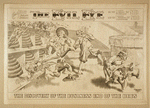Leo had led Salzman to the only clear place in the room, a table near a window that overlooked the lamp-lit city. He seated himself at the matchmaker's side but facing him, attempting by an act of will to suppress the unpleasant tickle in his throat. Salzman eagerly unstrapped his portfolio and removed a loose rubber band from a thin packet of much-handled cards.....When Leo's eyes fell upon the cards, he counted six spread out in Salzman's hand.
"So few?" he asked in disappointment.
"You wouldn't believe me how much cards I got in my office," Salzman replied. "The drawers are already filled to the top, so I keep them now in a barrel, but is every girl good for a new rabbi?"
---Bernard Malamud, "The Magic Barrel" in The Magic Barrel (1958)
In the title story of Bernard Malamud's National Book Award winning collection, a rabbinical student, Leo Finkle, secures the services of a "commercial cupid"--the marriage broker, Pinye Salzman. Salzman cleverly limits his options, initially presenting him with the potential match of "Sophie P." a twenty-four year old widow; "Ruth K." a nineteen year old beauty with a lame foot; and "Lily H." a woman he insists is only twenty-nine (Leo's brief meeting with her confirms that but she is at least thirty-five and "aging rapidly"). Rattled by his date with Lily, who believes him to be a true man of God, Leo gives up on the notion of an arranged marriage. At this point, Salzman offers his a packet of photographs of clients, which Leo leaves unopened for many months. Finally, in a miserable state, he examines the images, and falls in love with one very familiar image. Rushing to Salzman, he asks him to arrange a meeting with this woman. Salzman protests, insisting that this image was left in the packet only by accident. Pressing him, Leo learns that this is a photo of Salzman's daughter--a woman of a very questionable past who is now "dead" to her father. Suspecting that Salzman had been scheming to arrange this match all along, Leo nonetheless falls for the woman, seeing in her weary yet compelling face, his own salvation.
This is a story of immigrant culture but also and more importantly of the nature of love. I am most drawn to the image of the "magic" barrel--referred to only as a barrel in the text, and one that exists only in the imagination. The contrast of the limitless possibilities of the barrel--the thing we think we want--and the slender options that Salzman strategically presents is the locus of fascination for me. The perfect match (people, objects, situations) always resides in the future of the distance---it is always unidentifiable, or inaccessible, or unobtainable. Salzman cleverly creates a match that presents as the match--someone who suggests to Leo what love means: "he examined the face and found it good: good for Leo Finkle. Only such a one could understand him and help him seek whatever he was seeking. She might, perhaps, love him."
Friday, January 29, 2010
Subscribe to:
Post Comments (Atom)






No comments:
Post a Comment